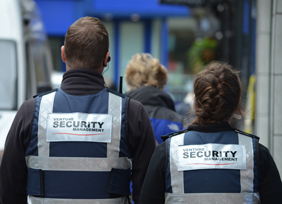Here we begin a series of articles reflecting on 2020. While it was a year of covid pandemic, plenty more has been going on, arising from or regardless of coronavirus, writes Mark Rowe.
The prospect of police and private guard forces being decimated by those with covid symptoms having to self-isolate only made more pronounced a question pressing ever since the public policing austerity of the 2010s: how to stretch the proverbial ‘thin blue line’, to have uniformed people visibly patrolling in public and semi-public places, both to reassure the law-abiding and deter the violent, thieving and anti-social?
As so often, a lead has come from the City of London. There some 22 guarding contractors in 2018 formed the City Security Council, which in June announced its on-street patrols, with police and City of London Corporation blessing, to protect City offices and other clients’ property both from general opportunist criminals and anti-capitalist protesters.
Outside London, the property and its tenants may not be as grand, but the need is similar; how to fill a gap between self-policing by retail and other businesses’ non-security staff, and police, so that hard-pressed shopping centres can attract and keep visitors and customers, by day and night. Our January and February print editions featured on-street patrols in Salisbury (pictured) and Winchester, and Basingstoke, each by Venture Security, the Andover-based guarding company that has Community Safety Accreditation (CSAS) from Wiltshire and Hampshire police forces.
While Paul Howe, Venture MD, deprecated any suggestion that his officers are doing police-style things, such work – also done by other guarding contractors through similar set-ups, in York and Plymouth for instance – is what some in the private security have regarded as a holy grail – of public space work that not only provides a public service, but is (symbolically or literally) alongside the police and a good advert for a responsible private sector.
While those trained and vetted for and carrying out CSAS work can be housing association or local government staff, PCPI (Police Crime Prevention Initiatives) has assessed more than 120 private companies seeking to run a CSAS. The scheme as set out in Section 40 of the Police Reform Act 2002 is aimed at services that reduce low-level crime and disorder (such as littering or begging) while assisting police by easing demands on them.
Kingston University featured in our January 2018 print edition. Briefly, Kingston University Service Company (KUSCO) is a specialist service and facilities management company, wholly-owned by Kingston University and working exclusively for the uni.
CSAS work is not a big market; at their last CSAS renewal in January 2020, by the Metropolitan Police, KUSCO had nine CSAS-accredited officers. Nor is that market during the economic slump due to the pandemic likely to flourish as the typical buyers of CSAS services are local government and business improvement districts, whose budgets are likely to be squeezed for the foreseeable future. Yet that does nothing to alter the reasons for CSAS in the first place, though it has proved very much a slow-burner; for various reasons, including each police force having to do the paperwork to sign off an accredited body.
Nigel Bell, Security Manager, KUSCO, said: “Kingston University wants to create a real presence in the borough that reflects the importance of our civic and community ambitions. We want an open and welcoming approach to collaboration between the University, local residents, businesses and the police. Security plays a major part in what we are seeking to achieve.
“Creating a safe and secure learning environment for students, staff, visitors and contractors has always been well-entrenched into the proactive nature of our security team. What CSAS has done is to enable us to extend our remit beyond the campus to tackle any anti-social behaviour in surrounding streets.
“I am delighted to report that the scheme continues to receive positive comments from students, staff, residents and police. CSAS means we can help students stay safe over a wider area and assist the police by taking the pressure off them, reporting incidents to them and helping them make the most of their hard-pressed resources.”
Ken Meanwell is the former Lincolnshire Police man who leads on CSAS on behalf of the National Police Chiefs’ Council (NPCC) for PCPI, the police body that assesses private sector companies for suitability for the scheme on behalf of the police. He said: “KUSCO is an excellent example of how CSAS has provided benefits to students, staff and local residents. The number of complaints from local residents has reduced significantly since the scheme was introduced.”









